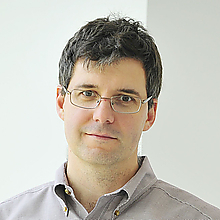 Mihai Pop, a professor of computer science in the Center for Bioinformatics and Computational Biology, recently co-organized an international workshop on next-generation sequencing (NGS).
Mihai Pop, a professor of computer science in the Center for Bioinformatics and Computational Biology, recently co-organized an international workshop on next-generation sequencing (NGS).
NGS allows scientists to sequence DNA and RNA quicker and cheaper than previously-used methods, and has greatly advanced the study of genomics and molecular biology.
“Next Generation Sequencing-Algorithms, and Software for Biomedical Applications,” brought together researchers from Europe and the United States to identify computational challenges and opportunities due to the rapidly increasing volumes of sequencing data and emerging experimental technologies that are tied to NGS.
NGS data have begun to appear in many applications that are clinically relevant, such as re-sequencing of cancer patients, disease-gene discovery and diagnostics for rare diseases, microbiome analyses, and gene expression profiling
The analysis of sequencing data is demanding because of the enormous data volume and the need for fast turnaround time, accuracy, reproducibility and data security
The weeklong conference, from Aug. 28 to Sept. 6, was held at the Schloss Dagstuhl-Leibniz Center for Informatics, recognized as one of the world’s premier meeting centers for informatics research
Assisting Pop in organizing the workshop were Gene Myers from the Max Planck Institute in Dresden, Knut Reinert from the Free University of Berlin, and Tandy Warnow from the University of Illinois, Urbana-Champaign.